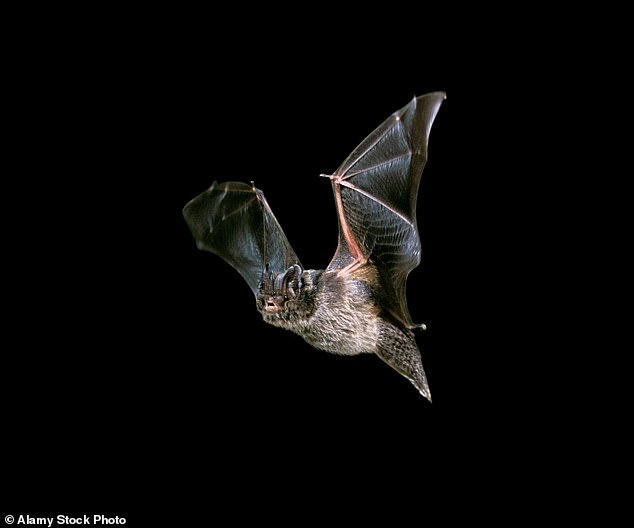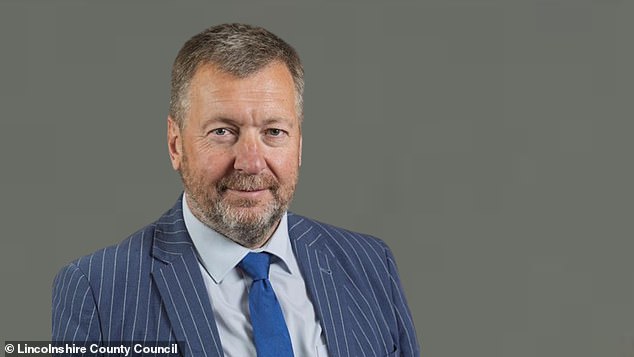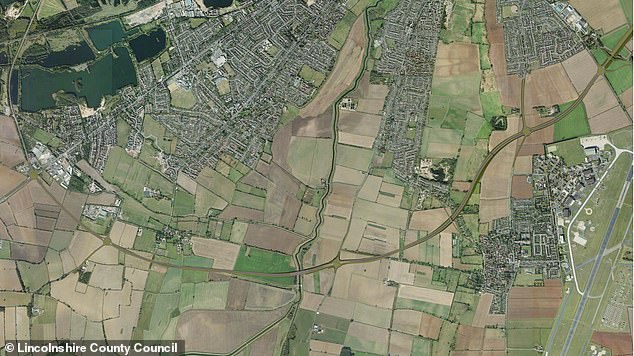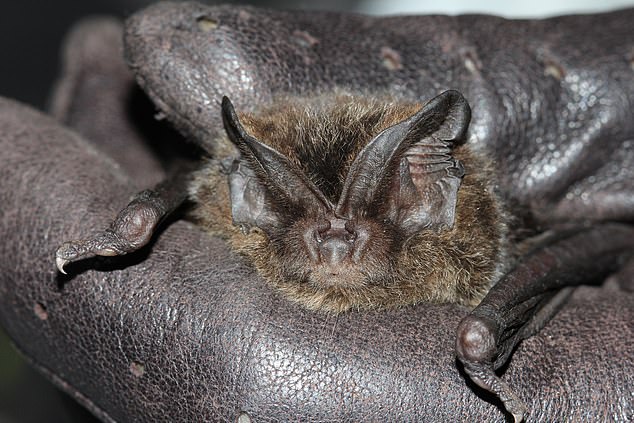They weigh not even half an ounce.
But a rare breed of tiny bat – just half a centimeter in length – is now at the centre of a huge political row.
The discovery of barbastelle bats in Lincolnshire risks derailing a long-awaited relief road after the leader of the council refused to fork out £4m for a bat tunnel.
Sean Matthews, a retired police officer who in May became the first Reform UK leader of Lincolnshire county council, has described the measures as ‘nonsense’ and insisted taxpayers ‘will not pay’.
The North Hykeham Relief Road project will form the final section of Lincoln’s ring road and is designed to reduce congestion in the south of the town.
Businesses say it is desperately needed but the project, which was previously expected to cost between £180m and £208m, is now expected to cost up to £218m after a number of issues were identified – including the discovery of the barbastelle bat, which are protected by law.
Mr Matthews received an updated estimate of the costs last month which included a £3 million for a fully grassed-over bridge ‘bat bridge’ and £1.3 million for a ‘bat tunnel’ as well as a number of bat ‘hop-overs’ which will offer space for the bats to cross the road.

The barbastelles are one of the UK’s rarest mammals, classed as ‘vulnerable’ on the UK Red List and at risk of extinction
Contractor Balfour Beatty and council officials drew up plans for the bridge with twin hedges planted along it to allow the bats to continue flying without hitting traffic, along with a 4mx4m tunnel which it is hoped the bats will fly through rather than across the road and into traffic.
The council points out the bats are not roosting in the area and that they only fly over the fields where the relief road will be built.
Mr Matthews said: ‘The long and the short of it is the taxpayers of Lincolnshire will not be paying £4.3 million for this.
‘We were elected to stop wasting money and that’s what I intend to do.’
Reform UK leaders across the country have been publicly pledging to cut council spending.
Last week, while on stage at the party conference in Birmingham, Richard Tice, deputy leader Reform and MP for the Lincolnshire seat of Boston and Skegness, highlighted the case as an example of bureaucratic excess.
Writing on Facebook Mr Tice later described it as ‘another batshit bat tunnel’ adding: ‘We will refuse this outrageous waste of taxpayers cash. Natural England can forget it…’
Mr Matthews said he was now tying to get to the bottom of who requested the bat tunnels after Natural England told him it had not.
He said he wasn’t sure if the bats were even there, as it was the furthest north they had ever been recorded.

Sean Matthews, a retired police officer who in May became the first Reform UK leader of Lincolnshire county council, has described the measures as ‘nonsense’ and insisted taxpayers ‘will not pay’

Aerial view of North Hykeham Relief Road, which will cost more than £200million
Work on the road is due to start in February and Mr Matthews said it would not be delayed. ‘At the end of the day this project will not be delayed by bats,’ he told the Daily Mail on Monday.
‘It would not bother a single person in my constituency if there were no bat tunnels. I am not making a political point, this is about saving money.’
He added: ‘I think bats have got enough protection. They’ve got sonar, haven’t they? They can avoid buildings, they avoid roads. I’ve never hit a bat with my car. Have you?’
Natural England only provides ‘bespoke advice’ on protected species where they form part of a Site of Special Scientific Interest or in exceptional circumstances and instead refers authorities to standing advice on the impact of particular developments on protected species.
Lincolnshire council’s head of highways infrastructure, Sam Edwards, told the overview and scrutiny management board that it was the furthest north the bats had been found in England and Wales.
He said it was ‘very clear from communication with Natural England [that], without mitigation, it will object to the planning application’.
He added that precedent suggested that Natural England’s argument would ‘hold favour, and it’s almost certain that the planning authority will have no choice but to recommend a refusal’.
Barbastelles are rare and distinctive species, with a pug-like face and large, wide ears. There are now thought to be only 5,000 in the UK, their population having fallen 99 per cent in the last 300 years.
The bats, which can live for 23 years and give birth to just one pup each summer, navigate along hedge lines so when a hedge meets a road, the bats keep going, putting them at risk from traffic.

There are now thought to be only 5,000 Barbastelles in the UK, their population having fallen 99 per cent in the last 300 years
The barbastelles are one of the UK’s rarest mammals, classed as ‘vulnerable’ on the UK Red List and at risk of extinction.
According to the Bat Conservation Trust, they are only found in southern and central England and Wales, making their discovery so far north of national importance.
It said that like all bat species, they are a vital part of our natural heritage and play an important role in the habitats they are found in.
By law, developers must avoid or reduce harm when rare species are present, which is why mitigation measures are proposed.
In Norfolk their presence killed off plans for the Norwich Western Link bypass earlier this year while the government has used the spending of more than £100m on a shed to protect rare bats in Buckinghamshire from HS2 trains as emblematic of Britain’s infrastructure woes.
The government is trying to pass legislation that would spell an end to such rows and will allow developers to fund ‘compensation’ schemes with the emphasis placed on creating new habitats elsewhere.
Critics including the Bat Conservation Trust have described this offsetting approach as a ‘licence to destroy nature’.
But Lincolnshire County Council’s Conservative opposition leader Richard Davies said ‘the system is geared towards the bat and against the people’.
He labelled Natural England ‘an unelected quango’ and said ‘rules are being forced upon people with no scrutiny’. ‘There’s anecdotal evidence that only 30 to 40% of bats use the tunnels,’ he said.
Mr Davies, a veteran Conservative county councillor in Lincolnshire who, until he was dislodged by Reform’s victory in May, was responsible for highways, said developers and council officials had to play a ‘game of pin the tail on the donkey’ when it came to environmental regulation.
He added: ‘Natural England don’t actually give you the detail of what you need to do. You keep submitting things until they say, yes, that fixes it. And then you enter this bizarre period of consultation and negotiation.’

Richard Tice, deputy leader Reform described it as ‘another batshit bat tunnel’ adding: ‘We will refuse this outrageous waste of taxpayers cash. Natural England can forget it…’
But he criticised Reform for claiming it will simply refuse to build the bridge and tunnel. ‘It’s an incredibly naive statement,’ he said. ‘You have to make a decision: do we build the road that we have planning permission for and funding for, with the bat bridge included? Or do we not build the road at all?’
People living and working in the area were clear that the road was needed.
Jack Good, founder of Reuseabox, which helps businesses recycle cardboard boxes and has a distribution centre in North Hykeham, said it was ‘vital’ infrastructure in the area was improved. ‘The roads are so over capacity it has a huge negative impact in the people who live here and the business,’ he said.
‘Environmentally I think it is important we do the right thing it. I would be working out how we can do it without impacting on the environment. The quicker they get on and do it the cheaper it is going to be. It should not be a political issue.’
IT consultant and North Hykeham resident Neil Baker, 52, described the additional cost of building a bat tunnel and bridge as ‘deeply disappointing.’
‘North Hykeham is a growing town with new housing estates popping up every where and has needed a bypass for as long as I can remember,’ he said. ‘The traffic on the weekends and at school times is often grid-locked.’
‘The cost of these projects also inevitably seems to spiral out of control and the bats will only add to that.’
Fellow retired local resident Tom Sharp, 60, agreed the economy of the area needed to be put before protecting the bats. Mr Sharp said: ‘From what I have read in the local media the bats aren’t roosting in the area of the proposed road but are only flying over it.
‘Lincolnshire is a massive county and on the other side of the proposed ring road there is still miles and miles of countryside for the bats.’
‘We need this road as quickly as possible,’ Mr Sharp insisted. ‘There have been long delays to a similar bypass in Grantham and we don’t want the same.’
One Waddington resident, where the proposed bat tunnel could be built, however, defended the scheme.
The woman, who did not want to be named, said: ‘We can’t just keep building more and more roads. ‘I walk my dog at night and often see bats swooping around. They are part of the environment and we should not just get rid of them.’
But teaching assistant Jo Carter, 50, said: ‘I know protecting nature is important but surely the money would be better spent on the NHS or our schools.’
A spokesperson for Natural England said: ‘Natural England was consulted twice as the proposal evolved, neither time did we give advice on bats or raise an objection to the scheme over bat mitigation for the North Hykeham Relief Road.
‘As such, we did not require, ‘demand’ or design the bat ‘culvert’ and ‘bridge’ mitigation.
‘The proposals have been designed by the developers based on their own ecological surveys and legal obligations.’












